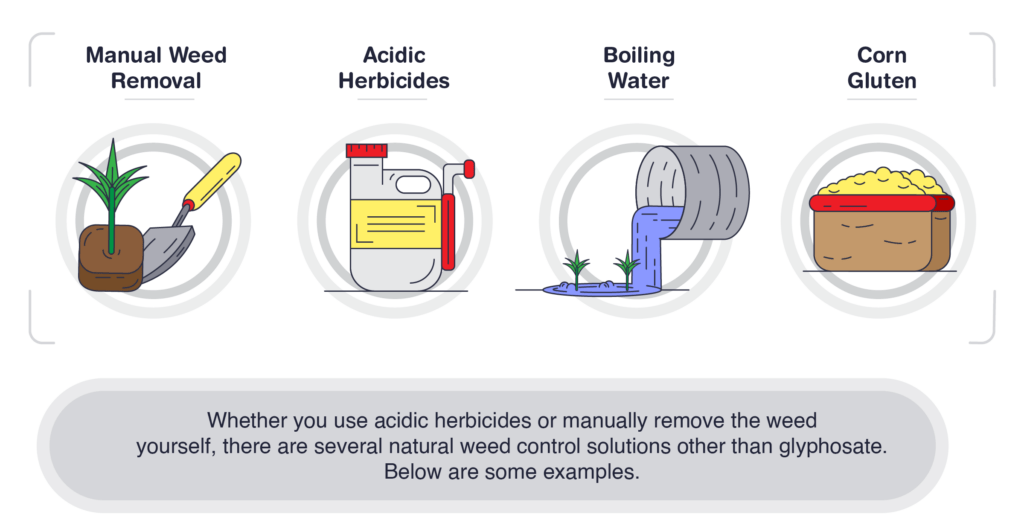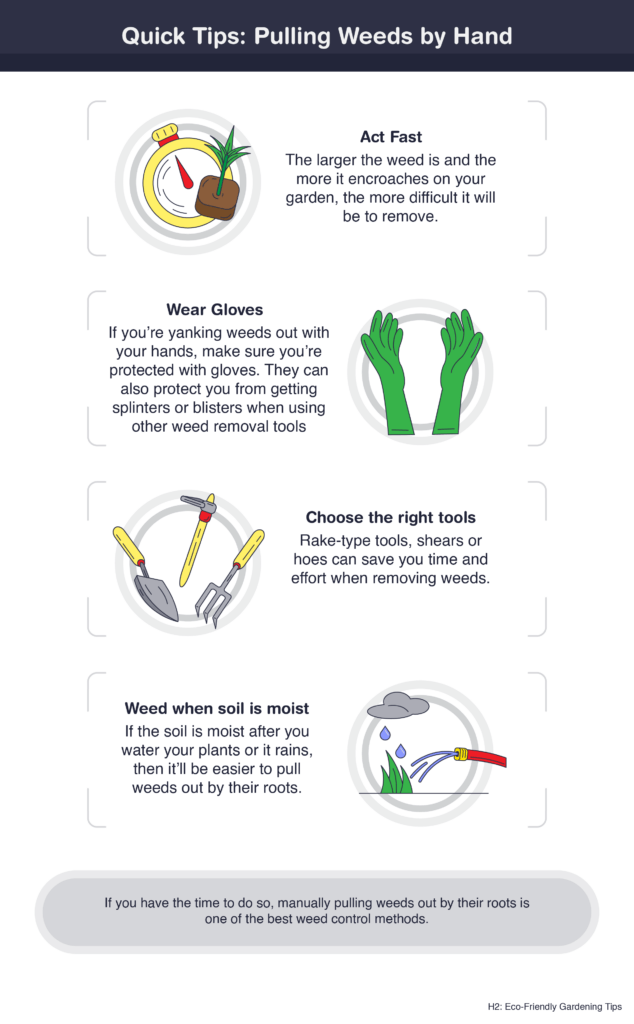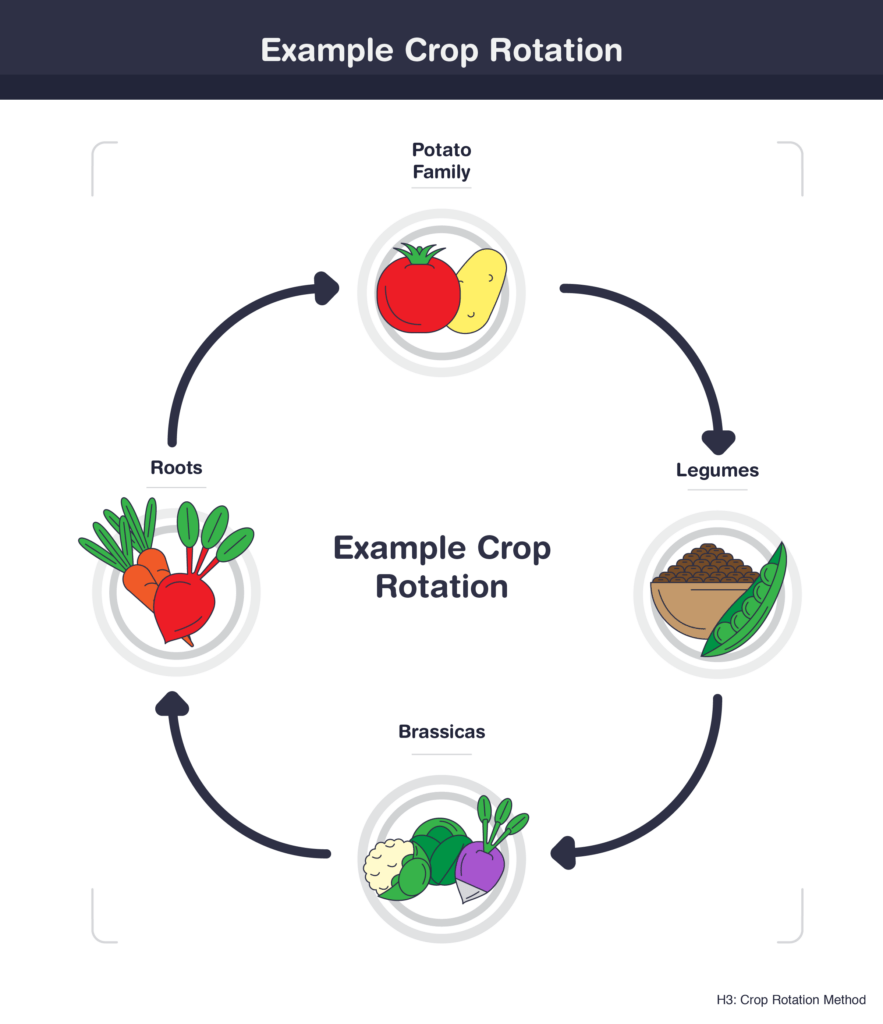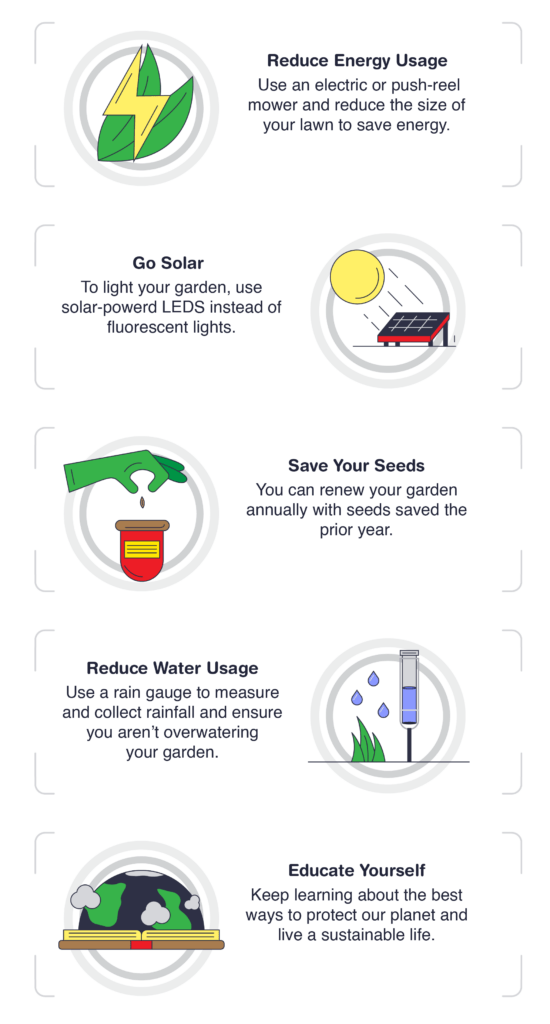
While Roundup is the most common glyphosate-based herbicide, research suggests it is toxic for users and the environment. In fact, the University of Washington linked glyphosate with a 41% increased risk of non-Hodgkin lymphoma in humans.
The chemical is also associated with environmental damage, harming microbiomes integral to the health of plants and animals.
Luckily, we’ve outlined several safe roundup alternatives you can use to keep your lawn or garden weed-free without risking your health. Check them out below.
Table of Contents:
- Natural Alternatives to Roundup for Weed Control
- Roundup Alternatives for Farmers
- Chemical Roundup Alternatives
- Eco-Friendly Gardening Tips
- Final Takeaways
Natural Alternatives to Roundup for Weed Control

Looking for an organic Roundup alternative? Whether you use acidic herbicides or manually remove the weed yourself, there are a variety of weed control methods that don’t require glyphosate.
Below are some examples.
Acidic Herbicides
Vinegar, also known as acetic acid, degrades cell walls and removes moisture from weeds to kill them. You need to be careful, however, since vinegar will indiscriminately damage any plants they touch.
Additionally, acidic-based herbicides usually kill the part of the weed that’s above ground, but not its roots. Multiple applications of vinegar will be necessary to slow the growth of weeds.
Commonly used acidic herbicides include:
- WeedPharm – 20%
- Maestro Gro’s Organic Vinegar – 20%
- Soil Mender – 10%
- Vinagreen Vinegar Weed Killer – 20%
- Apple cider vinegar – 5% – 6%
- White Vinegar – 5% – 6%
Be mindful of the acidic percentage of the herbicide you use. While solutions with 5-10% acetic acid concentration can help kill younger weeds, you’ll want higher concentrations if you want to control older plants.
Corn Gluten
While it’s more expensive than other herbicides, corn gluten is a natural Roundup alternative that won’t kill plants that have just begun to grow. In theory, spreading corn gluten powder or granules around your garden will kill germinating seeds for weeds before they sprout.
That said, the research on corn gluten’s effectiveness as a weed killer is conflicting. On one hand, research by Iowa State University found that corn gluten is a natural preventative weed control solution.
However, in a similar study, Oregon State University failed to duplicate those pre-emergent weed control effects with corn gluten. A Washington State University professor published a piece titled “The Myth of Weed-Killing Gluten,” asserting that no research suggests corn gluten is an effective weed control agent.
For this reason, corn gluten might not be the most reliable Roundup alternative in this list.
Manual Weed Removal
Perhaps the best natural Roundup alternative is to remove your weeds by hand. While manual removal can be difficult for larger weeds, when you pull them out by their roots, it ensures they won’t come back.

Here are some tips to follow if you plan on removing weeds by hand:
- Act fast: The larger a weed is and the more it encroaches on your garden, the more difficult it will be to remove.
- Wear gloves: If you’re yanking weeds out with your hands, make sure you’re protected with gloves. They can also protect you from getting splinters or blisters when using other weed removal tools.
- Choose the right tools: Rake-type tools, shears or hoes can save you time and effort when removing weeds.
- Weed when soil is moist: If the soil is moist after you water your plants or it rains, then it’ll be easier to pull weeds out by their roots.
If you have the time to do so, manually pulling weeds out by their roots is one of the best weed control methods. This way you don’t experience the negative impacts of Roundup exposure and you don’t have to file a lawsuit with pesticide companies.
Mulch
Mulch acts as a shield, blocking sunlight from the soil surface. This suffocates new weeds, preventing them from sprouting. Simply place a 2-inch layer of mulch around the plants you wish to protect to prevent weeds from emerging.
Common types of mulch include:
- Straw
- Pine bark
- Leaves
- Pebbles
- Pulverized rubber
- Grass clippings
- Woodchips
Since inorganic types of mulch such as pebbles and rubber won’t decompose, you won’t have to replace them after they’re set. However, using organic mulch like straw or grass clippings can improve soil fertility, structure and drainage as they decompose.
Iron-Based Weed Killers
Iron-based herbicides are particularly effective against broad-leaf weeds. The herbicides contain chelated iron that keeps it soluble and available for plant uptake. Broadleaf plants easily absorb chelated iron in high amounts, causing them to dry up and die. Since other plants, such as grass, don’t absorb as much of the chelated iron, they will typically survive while broadleaf plants around them die.
Iron-based roundup alternatives:
- Iron X! Selective Weed Killer
- EcoSense Selected Lawn Weed Killer
- Whitney Farms Ready-to-Use Lawn Weed Killer
- Fiesta
- Ortho Elementals Lawn Weed Killer
- Weed B Gon
That said, avoid using iron-based herbicides before a storm. Rain can wash off the chelated iron before it kills the weeds you want to die.
If your first application of iron-based herbicides doesn’t kill your target weed, reapply your herbicide after four weeks. Just don’t use the herbicide in the same spot more than four times a year. Your grass may darken in color after a treatment, but will typically recover within a week.
Soap Salts
Ammonium nonanoate, a chemical classified as a “soap-salt,” is often used to control weeds, mosses and underbrush. When ammonium nonoate comes into contact with plant tissue, it reduces the plant’s pH and causes plant cell death within minutes.
But this type of soap-salt only kills parts of a plant it’s directly applied to. Since it doesn’t spread out, it’s important to thoroughly cover the weed you want to kill.
Common herbicides with Ammonium nonanoate as an active ingredient include:
- Monterey Herbicidal Soap Concentrate
- Weed-Aside Herbicidal Soap Concentrate
- Concern Fast Acting Weed Killer RTU
Since Ammonium nonanoate is a naturally occurring substance, it’s an eco-friendly roundup alternative.
Boiling Water
Boiling water is a great alternative to Roundup in situations where a weed isn’t surrounded by other plants. This means it’s particularly handy when weeds are growing in cracks on sidewalks or near a patio.
Boiling water requires direct contact and will only kill parts of a plant it touches directly. A tea kettle is best to help keep this method as safe and controlled as possible.
Just use caution so you aren’t burned and your plants don’t die.
Roundup Alternatives for Farmers
As a farmer, you likely come into contact with herbicides more than most. To protect your health, you may want to utilize alternative herbicides and farming methods.
Additionally, since it’s common to use Roundup as an herbicide, glyphosate-resistant weeds are emerging. Researchers from California confirmed and identified glyphosate-resistant horseweed, hairy fleabane and ryegrass.
Crop Rotation Method
When you plant the same crop in the same spot every year, you guarantee pests and weeds a consistent food source. This encourages unwanted organisms to make that area their permanent home.

Crop rotation, or the practice of moving plant locations each year, throws off pests and weeds. It also has the added benefits of:
- Increased soil fertility
- Increased biodiversity
- Reduced pesticide requirements
- Improves soil microbiology
Keep in mind that crop rotation is easiest for farms that produce few crops with similar soil requirements. The more diverse your crop selection, the more complex crop rotation can be.
For a full guide on creating a crop rotation plan, check out this guide by Sustainable Agriculture Research and Education.
Biopesticides
Biological pesticides, or biopesticides, are living organisms sourced from plants, microorganisms or nanoparticles, that control agricultural pests and weeds. They release metabolites that protect plants from dangerous organisms.
Biopesticides are biodegradable and can reverse pest resistance problems spurred by chemical pesticides. That said, biopesticide adoption has been slowed since they aren’t as common or affordable as synthetic herbicides.
Chemical Roundup Alternatives
There are several chemical Roundup alternatives on the market, including:
- Glufosinate
- Diquat
- Pelargonic Acid
That said, according to a study by the Australian Herbicide Resistance Initiative, most chemical alternatives to Roundup are “limited, less effective and more expensive.” Additionally, many solutions are equally as toxic to humans as glyphosate. Keep this in mind as you search for an eco-friendly way to manage your weeds.
Eco-Friendly Gardening Tips

Replacing Roundup is just one step toward creating an eco-friendly garden. To make your garden more sustainable, follow the tips below:
- Reduce energy usage: Lawns are a huge energy-suck. You may want to plant shrubs or trees to reduce your lawn’s size and use an electric or push-reel motor when possible.
- Go solar: To light your garden, use solar-powered LEDS instead of fluorescent lights.
- Save your seeds: You can renew your garden annually with seeds saved the prior year.
- Reduce water usage: Use a rain gauge to measure and collect rainfall and ensure you aren’t overwatering your garden.
- Educate yourself: Keep learning about the best ways to protect our planet and live a sustainable life.
You may also want to start a compost pile, using scraps from your kitchen to fertilize your soil. This way you can reduce waste and help your plants flourish.
Final Takeaways
It’s no secret that, while Roundup is the most popular herbicide, exposure to paraquat & Roundup is linked to health risks such as cancer and Parkinson’s. Luckily, you can use natural alternatives to Roundup such as boiling water and manually ripping weeds out by the root to avoid safety risks.
If you developed non-Hodgkin lymphoma or a related cancer and were exposed to Roundup or paraquat, you could be eligible for financial compensation through a lawsuit. Connect with a member of our Roundup lawsuit team today.
For more eco-friendly weed control tips, check out our full infographic with Roundup alternatives and eco-friendly gardening tips below.


